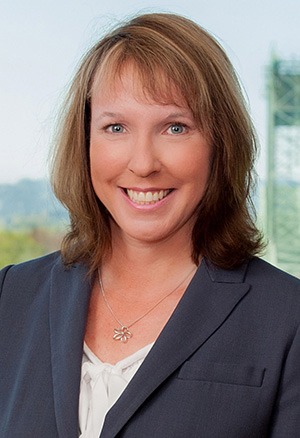
In the business community, attorneys are at the forefront of the COVID-19 crisis and they can mean the difference between a company’s life or death. Advising clients in rapidly changing and unprecedented conditions on sensitive topics such as layoffs, closures, medical leave, insurance, creditors’ rights and “whole new bodies of law that didn’t exist three weeks ago” – all remotely from home while managing families – is the new normal for corporate attorneys across the country. We asked local business attorneys to describe a day’s work in their industry. Visit vbjusa.com for more responses from local law firms including Schwabe, Williamson & Wyatt.
LeAnne Bremer, Partner-in-Charge, Miller Nash Graham & Dunn, Vancouver office
VBJ: What investment of time and technology have you made to stay connected to your clients?
Bremer: Our firm invested earlier this year in Microsoft Teams, a powerful team collaboration software (videoconferencing, messaging and remote file sharing), and getting people up and running on this system has been immensely helpful in moving our four offices across three states to remote work. While our decisions to help support employees in remote work were driven by a desire to improve efficiency and productivity, it’s made it easier for us to be nimble in working remotely. We were able to have a relatively seamless transition to an entire virtual office, while maintaining the same standard of client service.
VBJ: How are you accommodating and utilizing staff that are isolated at home with families and children?
Bremer: Attorneys are mostly used to working independently, and we had already invested in equipment and software that allow remote work before this crisis, so the transition has been relatively smooth. Our non-attorney staff has required a little more attention, because remote work is largely new to them, but because we were proactive around a comprehensive telework system earlier this year, there have been few instances of staff having any difficulty working from home. It has been an adjustment in terms of how we work together — when you can’t go find someone physically it requires a different kind of handoff and communication. We’ve also been supportive of people working the hours they have available to them, instead of just during the traditional workday, due to childcare and other at-home responsibilities.
VBJ: What kinds of questions are you hearing from your business clients right now?
Bremer: Many of the issues for business and industry clients revolve around staffing and health and safety. Business leaders want to know how to keep staff safe (if they are still operating), how to accommodate remote work (if employees are home) and sometimes how to reduce staff as they temporarily shut down, particularly the difference between layoffs or furloughs. And while some client industries are slowing down, others are getting busier, like manufacturers of medical technology. We’re very lucky to have an employment lawyer like Amy Robinson, who works with many Northwest employers on these issues.
Our public sector clients are dealing with how to operate transparently and efficiently in an era of no public and other face-to-face meetings. They are grappling with what emergency declarations can mean for them. Real estate and development clients are for the most part moving full steam ahead with their projects, though that may change if the economy is in lockdown for months at a time.
Many of our insurance and business attorneys are working around the clock to help clients navigate through issues related to insurance (business interruption), employment, creditors’ rights and contracts (especially “force majeure” provisions, which can be grounds to cancel, or delay performance under, a contract upon the occurrence of events beyond the parties’ control”).
Some of our attorneys have had to learn, very quickly, whole new bodies of law that didn’t exist three weeks ago. We’ve become adept at answering COVID-19 questions in a very short time, so we can help clients get through this.
VBJ: The information and mandates are changing quickly. What are you doing to stay ahead of the curve?
Bremer: Our team is very networked across the region, and we are plugged into industry groups and experts in various areas, so we know what’s happening minute by minute. We can draw on the resources of 150 attorneys across the firm to digest fast-moving legal changes. We’re also skilled at identifying misinformation that could be harmful to clients.
We’re also communicating information internally, to ensure we’re up to date on what we’re doing as a firm and how we’re shifting to serve our clients. One upside of this crisis is that it’s made us even better at virtual collaboration; with internal meetings happening around intense information-sharing, allowing us to work more effectively together and to protect our clients.
VBJ: What issues are specifically related to your Clark County clients?
Bremer: Real estate is a big part of the economy of Clark County, and we haven’t yet seen any change in real estate development in a significant way yet. Local governments are not providing in person services and public hearings are cancelled or will be converted to tele-meetings, so we all are doing everything electronically. The good news is that local jurisdictions are being responsive, putting alternative procedures in place to keep development going.
We’ve had quite a bit of change in Washington in employment law recently, including a new Paid Family Medical Leave that went into effect in January. We’re a resource to our local businesses who are dealing with this change and now seeing new federal requirements. The good news is that we are hearing from many in business who are optimistic that work is on the horizon and will come back once we start recovering from this crisis. – compiled by Jessica Swanson







